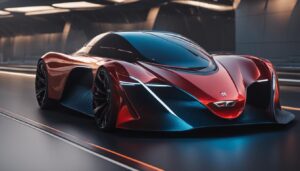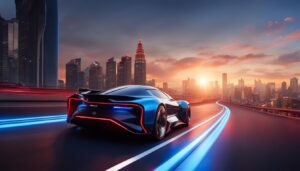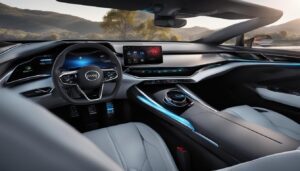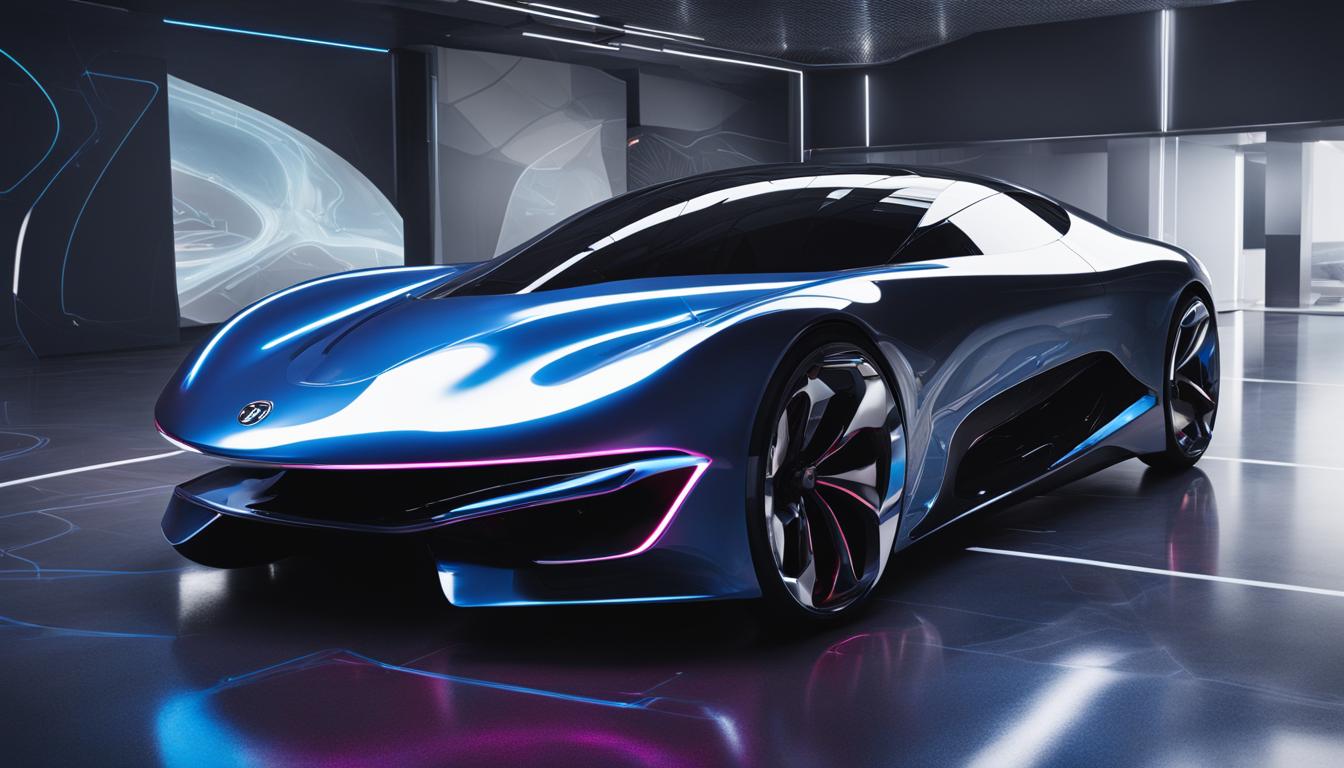Welcome to the world of revolutionized auto design! Artificial Intelligence (AI) is changing the game when it comes to customizing cars. With AI technology, car customization is becoming more innovative and tailored to your individual preferences and needs.
Gone are the days of limited options and cookie-cutter designs. AI is now optimizing the design process, simulating various components and processes, and developing new and efficient designs. It’s even analyzing your feedback and preferences, allowing for personalized car modifications like never before.
Get ready to experience a whole new level of customization and design possibilities. AI is here to transform the way we think about cars, and you’re at the forefront of this exciting revolution.

Key Takeaways:
- AI in car customization is revolutionizing the design and customization of cars.
- AI streamlines the design process with simulations, virtual design reviews, and automatic optimization.
- AI-based safety features enhance vehicle security with real-time information and advanced driver assistance systems.
- AI improves fuel efficiency and performance through predictive modeling and optimization.
- AI personalizes the driving experience by learning preferences and adjusting settings accordingly.
Streamlining the Design Process with AI
Incorporating artificial intelligence (AI) into the design process has revolutionized the way cars are customized. AI-powered simulations have become an invaluable tool for engineers, allowing them to predict how different components will perform without the need for physical prototypes. By harnessing the power of AI, designers can streamline the design process, saving both time and money.
One of the key benefits of AI in car customization is the ability to conduct virtual design reviews. With augmented reality and virtual reality technologies, engineers can now review and evaluate designs in a virtual environment. This eliminates the need for physical prototypes and allows for quicker iterations and improvements. Virtual design reviews have become an essential part of the design process, enabling teams to identify and address potential issues before the manufacturing stage.
Another significant advantage of AI in the design process is automatic optimization. AI algorithms can analyze vast amounts of data and automatically optimize various aspects of the vehicle design, such as fuel economy, aerodynamics, and performance. By leveraging AI-driven optimization, car manufacturers can create vehicles that are more environmentally friendly, efficient, and capable of delivering superior performance on the road.
Key Points:
- AI-powered simulations enable engineers to predict component performance without physical prototypes.
- Virtual design reviews using augmented reality and virtual reality technologies save time and money.
- Automatic optimization through AI algorithms improves fuel economy, aerodynamics, and overall performance.

Enhancing Safety Features with AI
Artificial intelligence (AI) is revolutionizing safety features in cars, making driving safer and more secure than ever before. AI-based safety features utilize advanced algorithms and real-time information to provide drivers with enhanced situational awareness and assist them in making informed decisions on the road.
One of the key advancements enabled by AI is the integration of advanced driver assistance systems (ADAS) into vehicles. ADAS uses AI algorithms to analyze data from various sensors, such as cameras and radar, to detect and identify potential hazards on the road. This includes identifying pedestrians, cyclists, and other vehicles, as well as detecting lane departures and potential collisions. By providing real-time feedback and warnings to the driver, ADAS helps prevent accidents and reduces the risk of injury.
In addition to ADAS, AI-powered sensors in self-driving cars play a crucial role in enhancing safety. These sensors can detect and identify obstacles in real-time, allowing the car to adjust its speed and trajectory accordingly. This technology has the potential to significantly reduce accidents caused by human error and improve overall road safety.
The benefits of AI-based safety features in cars include:
- Improved collision detection and prevention
- Enhanced situational awareness for drivers
- Reduced human error and improved road safety
- Real-time warnings and alerts for potential hazards
With AI at the helm, safety features in cars are becoming smarter and more efficient, paving the way for a future with fewer accidents and safer roads for everyone.

Predictive Modeling and Optimizing Fuel Consumption with AI
Artificial Intelligence (AI) is driving significant advancements in the automotive industry, particularly in the field of fuel efficiency. Through the use of predictive modeling, AI algorithms are able to analyze data from various vehicle sensors and optimize factors such as engine timing and air/fuel ratios. This optimization leads to improved fuel economy, reduced emissions, and ultimately, smarter vehicles.
By harnessing the power of AI, automakers can create vehicles that adapt to different driving conditions and provide an optimal balance between performance and fuel consumption. The predictive modeling capabilities of AI enable vehicles to dynamically adjust their settings based on real-time data, ensuring that the engine operates at its most efficient level at all times. This not only saves drivers money at the pump but also reduces their environmental impact.
Key Benefits:
- Improved Fuel Economy: AI-driven predictive modeling optimizes engine performance, resulting in better fuel efficiency and cost savings for drivers.
- Reduced Emissions: By optimizing fuel consumption, AI helps to lower the carbon footprint of vehicles, contributing to a cleaner and greener environment.
- Enhanced Performance: Smarter vehicles, powered by AI, can adapt to different driving conditions and provide drivers with a more responsive and enjoyable experience on the road.

As AI continues to evolve and innovate, we can expect even greater improvements in fuel efficiency and performance in the automotive industry. With ongoing research and development efforts, automakers are investing in the integration of AI technologies to create smarter and more sustainable vehicles. The future of automotive design is undoubtedly being shaped by the power of predictive modeling and optimizing fuel consumption with AI.
Personalizing the Driving Experience with AI
When it comes to the driving experience, AI is poised to revolutionize personalization. By learning your preferences, AI can adjust the vehicle’s settings to create a tailored experience just for you. Whether it’s the seat position, climate control, or even the music playlist, AI can seamlessly adapt to your individual preferences, making every drive more comfortable and enjoyable.
Imagine stepping into your car and having the vehicle automatically adjust the seat, mirrors, and steering wheel to your preferred settings. With AI, this level of personalization is becoming a reality. AI algorithms analyze your past driving behavior and patterns to understand your preferences and make automatic adjustments accordingly. This means that every time you get behind the wheel, the vehicle is already set up just the way you like it.
But AI doesn’t stop at adjusting vehicle settings. It can also provide AI-driven assistance throughout your journey. By monitoring the environment and analyzing real-time data, AI can alert you to potential dangers on the road. Whether it’s an upcoming pothole, a pedestrian crossing, or a sudden change in traffic, AI can provide you with the information you need to make informed decisions and stay safe on your drive.
With AI-powered personalization and assistance, the driving experience is being transformed. No longer is it a one-size-fits-all approach, but rather a customized journey tailored to your preferences and needs. As AI continues to evolve and improve, we can expect even greater levels of personalization and assistance in the future, making each drive a truly unique and enjoyable experience.
Overcoming Challenges and Limitations of AI in Automotive Design
While the integration of AI in automotive design presents exciting possibilities, it also comes with its fair share of challenges and limitations. One key challenge is data management. Organizing and managing large amounts of data required for AI algorithms can be a time-consuming and complex process. However, automakers are investing in robust data management systems to ensure data accuracy and accessibility.
Another challenge lies in meeting safety standards and regulations while fulfilling customer demands. As AI technology advances, it is crucial to ensure that AI-enabled vehicles adhere to rigorous safety standards to protect both drivers and pedestrians. Automakers are working closely with regulatory bodies to establish comprehensive safety guidelines for AI-driven automotive design.
Despite these challenges, automakers are making concerted efforts to overcome the limitations of AI in automotive design. Collaboration with AI development companies has become increasingly common, allowing automakers to leverage the expertise of AI specialists. Additionally, automakers are investing in research and development to optimize the use of AI and address the challenges associated with its implementation.
Automaker Efforts
- Partnerships with AI development companies to leverage expertise
- Investment in research and development to optimize AI integration
- Collaboration with regulatory bodies to establish safety standards for AI-driven vehicles
- Development of robust data management systems to ensure accurate and accessible data
By addressing these challenges and limitations, automakers are paving the way for a future where AI plays a vital role in automotive design. The seamless integration of AI technologies will lead to enhanced vehicle performance, increased safety, and personalized driving experiences.

Conclusion
AI is revolutionizing the automotive industry, paving the way for the future of auto design and car customization. By leveraging AI-powered simulations, virtual design reviews, and automatic optimization, the design process is becoming more efficient and cost-effective. With AI-based safety features, improved fuel efficiency, personalized driving experiences, and enhanced infotainment systems, the driving experience is being transformed like never before.
Automakers are fully embracing the potential of AI in car customization to shape the future of the automotive industry. By harnessing the power of AI, they are able to create innovative and tailored designs that cater to individual preferences and needs. The future of auto design is evolving, thanks to AI.
As the automotive industry continues to progress, challenges and limitations must be addressed. Data management and meeting safety standards are among the challenges that automakers are actively tackling. By partnering with AI development companies and investing in research and development efforts, they are working towards optimizing the use of AI in automotive design.
In conclusion, AI is transforming the automotive industry by revolutionizing the design and customization of cars. With its myriad applications and advancements, AI is reshaping the driving experience and shaping the future of auto design. The automotive industry is embracing AI wholeheartedly, confident in its ability to enhance and innovate the way we design, customize, and drive cars.
FAQ
Q: How is AI transforming the automotive industry?
A: AI is revolutionizing the design and customization of cars, optimizing the design process, simulating components, analyzing customer feedback, and enabling personalized car modifications.
Q: How does AI streamline the design process?
A: AI-powered simulations allow engineers to predict component performance without physically building them, while virtual design reviews using augmented and virtual reality technologies save time and money.
Q: What safety features are enhanced by AI?
A: AI-based safety features provide real-time information about potential hazards on the road, allowing self-driving cars to detect obstacles and adjust speed accordingly. Advanced driver assistance systems (ADAS) enhance situational awareness for drivers.
Q: How does AI improve fuel efficiency and performance?
A: AI uses predictive modeling to analyze data from vehicle sensors, optimizing factors like engine timing and air/fuel ratios. This results in improved fuel economy, reduced emissions, and smarter vehicles that adapt to different driving conditions.
Q: How does AI personalize the driving experience?
A: AI learns the driver’s preferences and adjusts the vehicle’s settings accordingly, creating a tailored driving experience. From seat position to music playlist, AI enhances comfort and enjoyment. AI also provides assistance by monitoring the environment for potential dangers.
Q: What challenges and limitations does AI face in automotive design?
A: Challenges include data management for AI algorithms, meeting safety standards and regulations, and fulfilling customer demands. Automakers are addressing these obstacles by partnering with AI development companies and investing in research and development efforts.
Q: What is the future of AI in car customization?
A: AI is revolutionizing the automotive industry and shaping the future of auto design. It is set to continue transforming the design and customization of cars, offering innovative and tailored experiences for drivers.
Last Updated: December 31, 2023




Recent Comments